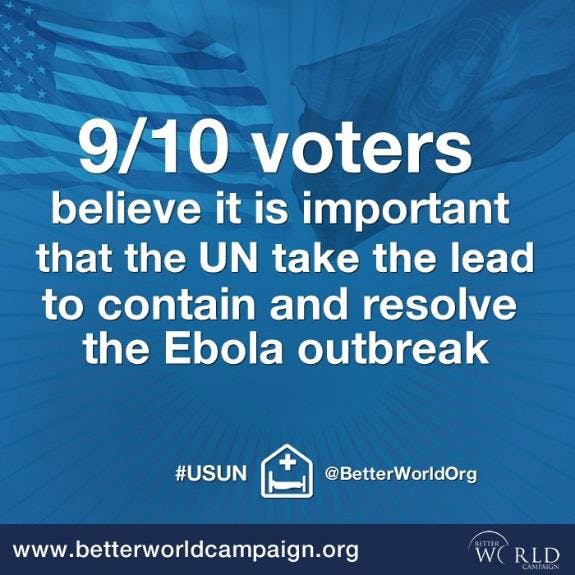Today, October 24, marks the anniversary of the UN Charter, established in 1945. As the global community works to respond to the Ebola outbreak — which World Health Organization (WHO) Director-General Margaret Chan has called “likely the greatest peacetime challenge that the United Nations and its agencies have ever faced” — there has perhaps never been a more appropriate year to honor the working relationship between the U.S. and the UN.
As we’ve seen with Ebola, disease outbreaks don’t stop at borders. A global threat like this requires global cooperation, and strong collaboration between the U.S. and the UN means a stronger response to this deadly disease. 
The UN, working in partnership with governments and NGOs, is the institution with the international scale and mandate to play a leading role on a global solution to the Ebola crisis. As part of this effort, the UN General Assembly and the Security Council — under leadership from the U.S. government — have created the United Nations Mission for Ebola Emergency Response (UNMEER).
This is the right step for the UN, and the right platform for the U.S. to utilize as it responds to the outbreak. UNMEER brings together the resources of UN agencies, funds, and programs to reinforce the WHO’s technical expertise and experience in disease outbreaks.
Additionally, working with partners, the WHO has constructed three Ebola treatment centers in Guinea, 12 in Liberia, and 15 in Sierra Leone – 30 out of the 50 that are needed. These facilities contain more than 1,100 beds for people infected with Ebola, with an anticipated 2,500 beds coming available in the next few weeks. The WHO has also deployed more than 700 experts to West Africa since the beginning of the outbreak and helped setup “training academies” for local health workers.
The UN’s work effectively complements U.S. efforts. President Obama has made containing the spread of the virus a national security priority, and the United States has committed over $1 billion in funding to the Ebola response in West Africa.
The U.S. has a vested interest in stopping this deadly outbreak, but we cannot go it alone. By working with the UN, we can achieve progress in this epidemic.
This UN Day, we should raise our voices in support of the U.S.-UN partnership. It is an essential resource to navigate our way out of this crisis.



 View All Blog Posts
View All Blog Posts